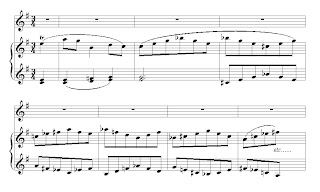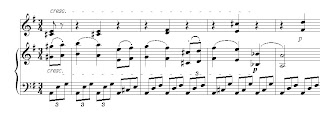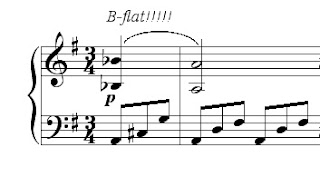There is probably a better way of putting this. But who cares? I enjoy Beethoven the most when he doesn’t insist so much on being “manly.” For example, the “Eroica” Symphony is just manly enough; the last movement of the Fifth Symphony is way too manly, etcetera etcetera …
Beethoven’s anomalies, his offbeat sforzandi, his moments of disruption, jagged dissonances, rhythmic refusals-to-conform: these events can pose either as comic or heroic, or points between. (Comic or heroic dissonances: the difference between the “accidental” and the “chosen” wrong note?) If you trace the line from Haydn’s humorous quirks to Beethoven’s, if you watch the incubation of the Haydnesque egg in early Beethoven, you see how gradually the comic, opera buffa incidents hatch (!), grow into more “serious” usages, until accidents become more and more structural, more and more life-threatening … until Beethoven, in a sense, really “means” them.
Sometimes I wonder: why, oh why, Ludwig, do you have to mean them SO MUCH? If occasionally I have trouble taking the Appassionata Sonata as seriously as it needs to be taken (though I can see, from a certain emotional distance, how great it is), I have no trouble at all taking Beethoven’s funnier, “lighter” pieces very seriously, totally to heart.
For instance, Op. 96. Beethoven doesn’t get gentler than Op. 96, or more profound. The piece begins with the inviting trill, the fourth, the unchallenging diatonic, the definition of a world: the pastoral and, by association, the country dance; rolling triple meters, easy blossoming dialogue …

There are no destructions, no crises; there are lots of circling, hovering, beautiful moments: and that’s enough, thank goodness … enough to present a whole world of human experience. Yes, it is possible not to be epic, or overwrought, and yet to do something complete, arching, emotionally significant.
Put another way, Op. 96 does not feel at all “confined” in its lyricism. But, it does engage the question of bounds. The impetus for this post was the following moment (which I just played some 15 times with JB):
The pianist wanders off (“out of bounds”), lets the chromatic spirit take him, and JB must sit idly by, while I blur. Haha. You just wait over there, Mr. Violinist, while I have some fun. Too bad for you! The fact that the violin does not play here is (of course) no accident. It suggests that while one element of the piece sits by, passively (helplessly?) another is let loose, unmoored. The violinist, perhaps, is the saner melodic, assembling, force … while the pianist at that moment symbolizes some lone renegade element of the piece–a chromatic vigilante!–some dissociated, dissociating urge. The image that keeps coming to my mind is a beach ball, (happily) neglected, accidentally dropped into the water, sailing off in some unexpected current.
A million similar tender transgressions lurk under the surface tranquility of Op. 96. The gentle giant, Beethoven, having set up the general frame of the piece—the lyrical, the dancical (heh)—creates a play at its edges … a fuzziness at the edge of the piece’s mood.
One of the most beautiful fuzzinesses of the piece is here:

Let’s say the first idea of the piece is pastoral, and the second “theme” is more purely and classically comic; in comparison this third (or closing theme) seems to suggest an awakening Romantic. This Romanticism is partly a harmonic proposition: the entire theme is played out over a dominant prolongation (if your eyes are glazing over, non-music-theory people, I’m sorry!); in other words, it lives penultimately, on the continuous verge of delayed resolution (you don’t need any racier metaphors from me, as much as I’d love to supply them). And partly this Romanticism is a question of motive: the two portato notes (portato, notes against resistance, caressing notes) headed always for the dissonance/resolution … musical heaves and sighs. Get the picture?
This “Romantic” theme cannot, by its nature, end. This would ruin it. A cadence would be nonsense, would feel tacked-on; its ending is therefore, by necessity, a non-ending. (The cadence is anathema to the true Romantic.) How not to end? The ongoing crescendo, as so often in Beethoven, meets the “accident” of a subito piano, and in place of D-major diatonic tones, we get the “accidental” B-flat:

Whoops! Except that the “mistake” is so *&(*ing beautiful. It’s no kind of ending, per se, in the Classical sense, but this little dark intrusion sticks out enough to make itself into at least a semicolon, just, in a sense, by being there … they say half the job is just showing up! I think of it as a kind of “marker”: within a predominantly sunny, G major, pastoral piece, an unexpected minor-key inflection, a call or signifier from another work (momentary, fleeting). It’s the sort of thing that one imagines Schubert must have really paid attention to, that he must have digested over breakfast some morning, saying to himself “Ach! That is fantastic! I must use that!” before knocking off fifty or so songs and calling it a day.
Most magically of all, when the violin’s turn comes, these final two notes, constituting the false ending, are repeated four times in a row, as if a broken record …

Since records were apparently not invented yet (according to my scholarly research on Wikipedia), perhaps it is more appropriate to describe this moment as an echoing or reverberation, a sinking-in of the last two notes … a propagation through time (which is musical space). Again strangely I am reminded of the beach ball, of waves, of something being allowed to drift.
The first time this happens, I think it is unarguably weird, as if, again, the violinist were “stuck.” (So many times in a row!) But, it turns out, Beethoven repeats these two affecting notes exactly four times, making a kind of peculiar, but standard, four-bar phrase out of nearly nothing, out of pure iteration. And then this four-bar idea (nothing) becomes kind of the foundation of the development. (Castles in the air.) So: what was excessive, bizarre, transgression, becomes normative, becomes the rule. Beethoven founds a temporary grammar on exception and paradox. The composer’s magic of getting the listener to accept the bizarre or asymmetrical. And once the strange becomes “normal,” then departures from the strange themselves become strange, the Alice in Wonderland, upside-down, beautiful world is created.
Watching this winding in and out of normality through the development, as we play it each night, I do feel like what I imagine the children, say, in Chronicles of Narnia feel stepping through the wardrobe, and the faun in the forest says hello. A hush comes over me in each development, each performance. Tightrope act: you don’t want to make a false move, or the dream will vanish, but on the other hand, you must relax and let the dream take you where it wishes. And dramas in Narnia reverberate back and forth significantly to reality (the development, as meditation, back to the exposition, music into life, etc.) … my touring life against “real life,” the symbol against the event, the idea versus the thing … how much does my immersion in the development of Op. 96 affect the way I live my so-called normal life? The children of Narnia must leave the fantasyland behind in order to grow up.
Just at that moment, when I am absorbed pristinely in the Beethovenian loveliness, and associated questions, happy as a clam, the man’s cell phone rings across from me (in the Quiet Car, no less!): it is Für Elise. How ever did that become the National Anthem of Beethoven? Für Elise, played heartlessly by a computer chip (have a heart, chip!). I stare for a scornful moment at him and his device, baleful angels of reality; he smiles at me, a polite businessman’s smile, and when I look back down at the open page of my score, the wardrobe is just a place to hang your clothes.



7 Comments
A ridiculous midi file of the second page of LVB’s Op. 13 sounded during an ear training exam I was taking last week. The offending cell phone belonged to an early music major who had recently told me she doesn’t go for that tragic-heart-Beethoven-the-victim crap. Would that be irony or hell?
i get the picture of the musical heaves and sighs very well, what a ride you’ve taken us on. don’t let that wardrobe be just a place to hang something for too long; it’s nice going to far away places.
thanks for the insightful analysis as usual – now to do the same for my beethoven sonata ;o
I did wander like a turning leaf in the soft breeze of your moment while JB was silently standing waiting and at the same time closed his eyes passing through every notes like I was brought from every direction the air blew me but then as soon as you finished the last note, I came back into my own reality. I was so glad there were no distractions of ringing cell phones and hacking cough while I was w/ you in that journey. You were the breeze that night.
I love that passage and I wish you’ll play this sonata again.
Simply marvelous, Dr. Denk. The beauty of your playing is equalled only by the beauty of your writing. I’m sorry I won’t get the chance to hear the fantastic Op. 96; seems we Northern Californians don’t get the privilege of being on your tour schedule this year. 😉 But I hope the recording that JB’s hinted at doing with you becomes a reality!
‘Beethoven is an insane masculine joy,’ – one of my piano tuners suggested once. Isn’t THAT marvelous?
I have absolutely nothing against his ‘manly’ oddness, the more the better. Yammmm…
“Chromatic vigilante.”
Priceless.
JSG